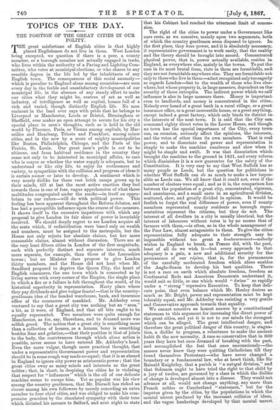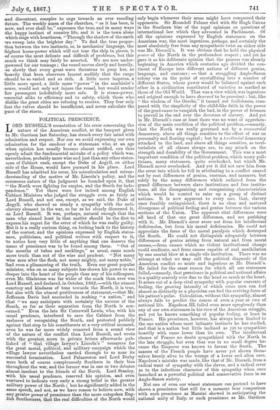TOPICS OF THE DAY.
THE POSITION OF THE GREAT CITIES IN OITR POLITY.
THE great misfortune of English cities is that highly placed Englishmen do not live in them. West London being excepted, we question if there is a peer, a county member, or a borough member not actually engaged in trade, who lives within the authority of a Paving and Lighting Com- mittee, who votes at municipal elections, or who shares to any sensible degree in the life led by the inhabitants of any English town. The consequences of this social anomaly— which is peculiar to England alone among countries—are seen every day in the feeble and unsatisfactory development of our municipal life, in the absence of any steady effort to make our cities what they might be, centres of art as well as industry, of intelligence as well as capital, homes full of a rich and varied, though distinctly English life. No man eminent in the land ever says with pride that he belongs to Liverpool or Manchester, Leeds or Bristol, Birmingham or Sheffield, ever makes an open attempt to secure for his city a special place in men's thoughts, such as is held in the old world by Florence, Paris, or Vienna among capitals, by Mar- seilles and Hamburg, Trieste and Frankfort, among minor cities, and in the new by a score of mighty municipalities like Boston, Philadelphia, Chicago, and the Paris of the Prairie, St. Louis. Our great men's pride is not to be citizens, and from habitual residence in the country they cease not only to be interested in municipal affairs, to care who is mayor or whether the water supply is adequate, but to understand or like city life, to enjoy its restlessness and variety, to sympathize with the collision and progress of ideas it is certain sooner or later to develop. A sentiment which is very nearly dislike for these vast brick camps grows up in their minds, till at last the most active emotion they feel towards them is one of fear, vague apprehension of what those multitudes congregated under the smoke—in itself an oppro- brium to our rulers—will do with political power. This feeling has been apparent throughout the Reform debates, and has had a perceptible influence upon the course of the measure. It shows itself in the excessive impatience with which any proposal to give London its fair share of power is invariably received. We should deeply regret to see London acquire all the seats which, if redistribution were based only on wealth and numbers, must be assigned to the metropolis, but the House not only rejects her absolute claims, but her more reasonable claims, almost without discussion. There are at the very least fifteen cities in London of the first magnitude, each with perfectly distinct and separate interests, much more separate, for example, than those of the Lancashire towns ; but no Minister dare propose to give London thirty members, and the House did not hoot when Mr. Sandford proposed to deprive the Queen City, the heart of English commerce, the one town which is connected as by living nerves with every corner of the Empire, the single place in which a fire or a failure is felt throughout the world, of its historical superiority in representation. Nasty place where they pay dividends and give vulgar feasts!—that is the country- gentleman idea of the bonded warehouse, bank, and insurance office of the commerce of mankind. Mr. Adderley even ventured to say that a great city was nothing but an " area," a bit, as it were, of England, and that all bits ought to be equally represented. Two members were quite enough for Manchester, as for, say, Shoreham, and to demand more was selfish greed. The notion that a great city is something more than a collection of houses, as a human bone is something besides lime and gelatine,—that their position is that of joints to the body, the contrivances through which alone action is possible, never seems to have entered Mr. Adderley's head. Even the more vulgar, though more practical thought, that under a representative Government power and representation should be in some rough way made co-equal; that it is as absurd in England to ignore city power as aristocratic power ; that the great cities sway as many minds and interests as the great nobles ; that, in short, in despising the cities he is violating that respect for " influences ' which is the oil of our delicate machine seems to escape him. Yet so popular was his view among the country gentlemen, that Mr. Disraeli has risked an &cute among his own followers by merely conceding an extra member to four chief cities, and was obliged to make his com- promise graceless by the simulated sympathy with their tone which dictated his menace to Salford, and next night to state that his Cabinet had reached the uttermost limit of (*flees._ sion.
The right of the cities to power under a Government like ours rests, as we conceive, mainly upon two arguments, botht of which the country gentlemen seem disposed to ignore. In, the first place, they have power, and it is absolutely necessary,. if representative government is to work easily, that the reality and the theory should be brought into accord. Concentrated' physical power, that is, power actually available, resides in England, as everywhere else, mainly in the towns. To put the- case in its most brutal form, riots in them are formidable, an& they are not formidable anywhere else. They are formidable not. only to those who live in them—afact recognized only too eagerly as regards London—but to the wealth of those who live else- where, but whose property is, in large measure, dependent on the• security of those entrepots. The indirect power which we cal influence is also in large measure there. Money is important. even to landlords, and money is concentrated in the cities.. Nobody ever heard of a great bank in a rural village, or a great insurance office, or a great mercantile house, or a great anything,_ except indeed a great factory, which only binds its district to. the interests of the next town. It is said that the City can. command eighty direct votes in the Lower House, and though. no town has the special importance of the City, every town• can, on occasion, seriously affect the opinions, the interests,. and the votes of other than its own members. That is real power, and to dissociate real power and representation is. simply to make the machine cumbrous and slow when it might be simple and swift. It was that dissociation which, brought the machine to the ground in 1831, and every reform, which diminishes it is a new guarantee for the safety of the- Constitution. It is very easy to say that West Suffolk has as- many people as Leeds, but the question for politicians is, whether West Suffolk can do as much to make a law impos- sible as Leeds can. We all know that it could not, even if the number of electors were equal ; and as it is, the comparison lies. between the population of a great city, concentrated, vigorous,. and unanimous, and a small caste in an agricultural divisions scattered, slow, and greatly divided in opinion. It would be foolish to forget the real difference of power, even if county- members represented county residents as borough repre- sentatives represent the citizens, but they do not. The- interest of all dwellers in a city is usually identical, but the- interest of labourers without votes is by no means that of ' farmers with them,—is often, as in the whole management of the Poor Law, almost antagonistic to theni. To give the cities; representation fully adequate to their strength may be impossible without too great a bouleversement—nobody- wishes in England to break, as France did, with the past,. least of all do we wish it—but every approach to that adequacy is a gain, a new and additional security for the- permanence of our regime, that is, for the permanence: of the carefully moderated freedom which alone enable the Anglo-Saxon to develop his best qualities. There- is not a race on earth which absolute freedom, freedom as. Continental Reds and American Democrats understand it,_ would suit so little, or one which would " dwine " so rapidly- under a " strong " repressive Executive. To keep that deli- cate poise, that even balance which Mr. Henley desires as. much as Mr. Bright, power and representation must be kept, tolerably equal, and Mr. Adderley was resisting a very gentle and Conservative approach towards that equality.
We cannot conceive an honest answer by a constitutionar statesman to this argument for increasing the direct power or the great cities, and yet it is not to our minds the strongest. which can be alleged. The great intellectual danger, awl therefore the great political danger of this country, is stagna- - tion, a dislike to progress, a reluctance to make the ancient.
habit fit the new necessity. A race so conservative that in 800' years they have but once dreamed of breaking with the past, and accomplished the feat that once unconsciously—the masses never knew they were quitting Catholicism till they found themselves Protestant—who have never changed a.
boundary or a fundamental law, who at heart think, like Sir Rainald linightley, that a parish is " a natu,ral division," and that Solomon ought to have tried the right to that child by a jury of twelve, are governed by a class in which the dislike of change is developed almost into a disease. They would not advance at all, would not change anything, any more than French nobles or Cumberland " statesmen," but for the impetus given by the cities, by the populations in which the mental unrest produced by the incessant collision of ideas, and the vague hankerings developed by that mental unrest. and discontent, conspire to urge towards an ever receding future. The weekly amen of the churches, " as it has been, is 410W, and ever shall be," expresses the true, and in many ways the happy instinct of country life, and it is the town alone which sings with heartiness, " Through the shadow of the earth +we sweep into the brighter day." To find the true propor- tion between the two instincts, or, in mechanics' language, the highest horse-power which will not tear the ship in pieces, is
• of course the most delicate and difficult of problems, but this .much we think may fairly be asserted. We are now under- ipowered for our tonnage ; the vessel moves slowly and heavily, -so slowly that every great wave threatens to poop her, so !heavily that keen observers lament audibly that the cargo should be so varied and so rich. A little more impetus, a !little more speed, a little more "power " in the machinist's =sense, would not only not injure the vessel, but would render her passengers indefinitely more safe. It is steam-power, tessential alike to efficiency and to safety, which those who dislike the great cities are refusing to receive. They fear only lest the valves should be insufficient, and never calculate the race of the storm.































 Previous page
Previous page